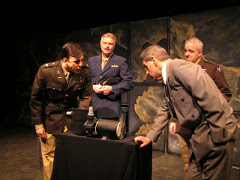
Kelly Aliano
|
Bombs Away
Review: "Daylight Precision" According to Horace, the purpose of theater is twofold: to educate and to entertain. "Daylight Precision: An American Tragedy," written by Douglas Lackey and directed by Alexander Harrington, certainly accomplishes the first. The play concerns itself with important lessons about the use of strategic bombing during the Second World War and the related moral and ethical consequences. What Lackey's play lacks is the latter; ultimately this play is more lecture than theatrical experience. The protagonist, Haywood Hansell, basically has one point of view that does not develop over the course of the drama. Rather, he talks at his fellow characters, as well as the audience, for much of the play's five acts. The play entirely misses its mark; the historical material is never contextualized so that it feels relevant to a contemporary audience. This is a document of the past, not a hard-hitting commentary for the present. The play focuses on Hansell's plan only to bomb strategic sites throughout Europe, as opposed to cities, and the backlash he incurred from the rest of the Allied brass for this idea. His sentiments are only heightened by his interactions with British pacifist Vera Brittain and a young soldier. Yet, the military higher-ups around him become more and more disillusioned as the war drags on. In order to make Hansell's point abundantly clear, the play covers numerous scenes throughout the war. It seems as if the same idea has to be drilled into the audiences' minds, as it needed to be reminded to these military leaders: the only way to survive war is to maintain one's moral and ethical standpoint.
Although that point is a valid and imperative one, great drama is borne of conflict and here there is little of the opposing standpoint that holds water. Curtis LeMay, Hansell's foil, comes across as a rough and unpleasant man, who cares more for the violence of warfare than for intellectual debate. The dialogue is preachy standing in for poetic; the performances are performed as opposed to human. I felt like all these characters had more to show of themselves, who they were, how they felt and why, but the text never let the actors explore these depths. Danielle Delgado is particularly compelling as Brittain, a character who, in my opinion, could have been presented as more fully fleshed out in terms of her backstory. Similarly, by meeting Hansell en media res of the war it is hard to establish how he came to these ideas except via his interactions with the female British writer. The set, an interactive backdrop from which set pieces are removed and replaced, is perhaps the show's most innovative element. Yet, the need to reset for the play's numerous scenes is time-consuming and breaks the flow of the action. Many elements, such as projections and musical interludes, seem included to create a much-needed alienation effect to facilitate spectator contemplation, are mostly just disorienting and distracting.
Certainly, there is much to learn from history and theater is a place to bring such lessons to life. However, without dramatic action and some emotional or intellectual in-roads for an audience, the play is nothing but didacticism. "Daylight Precision" takes its burden of educating its audiences too much to heart, not allowing its viewers a chance to feel truly entertained. In so doing, it misses its main target: teaching its audience an important lesson through the key pedagogical tool of pleasure.
|
| museums | NYTW mail | recordings | coupons | publications | classified |



